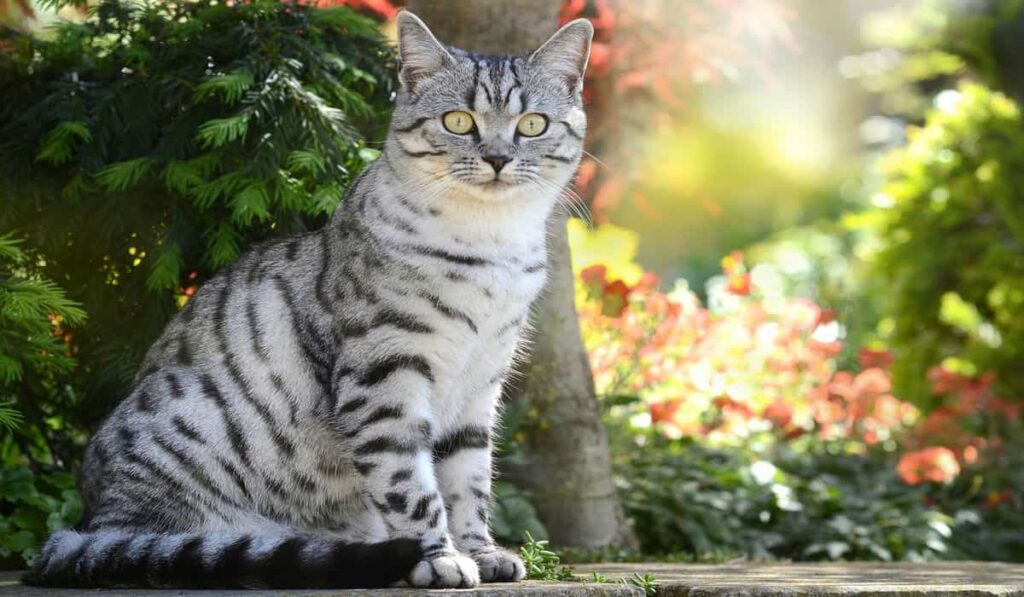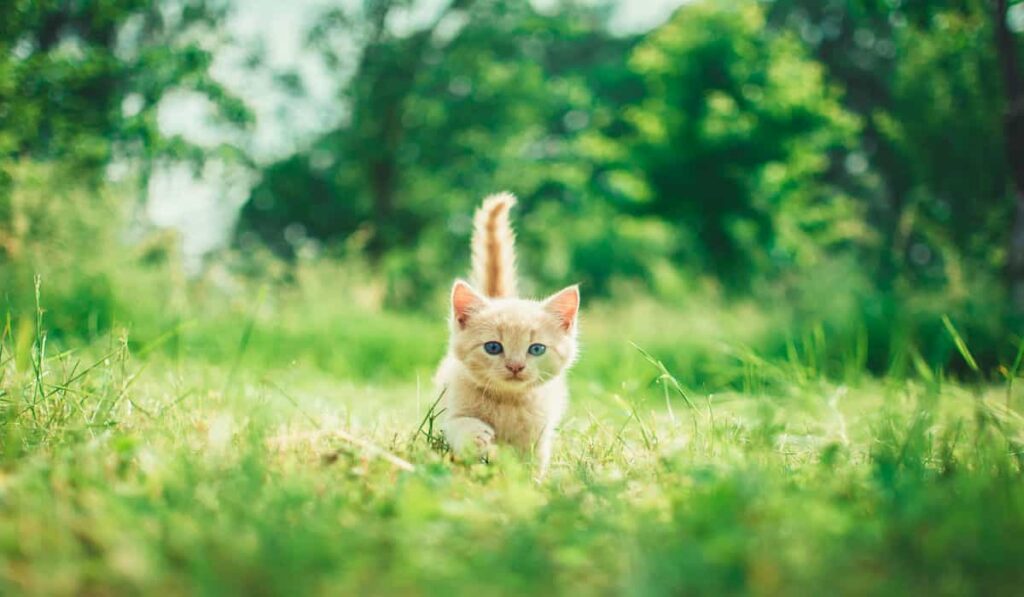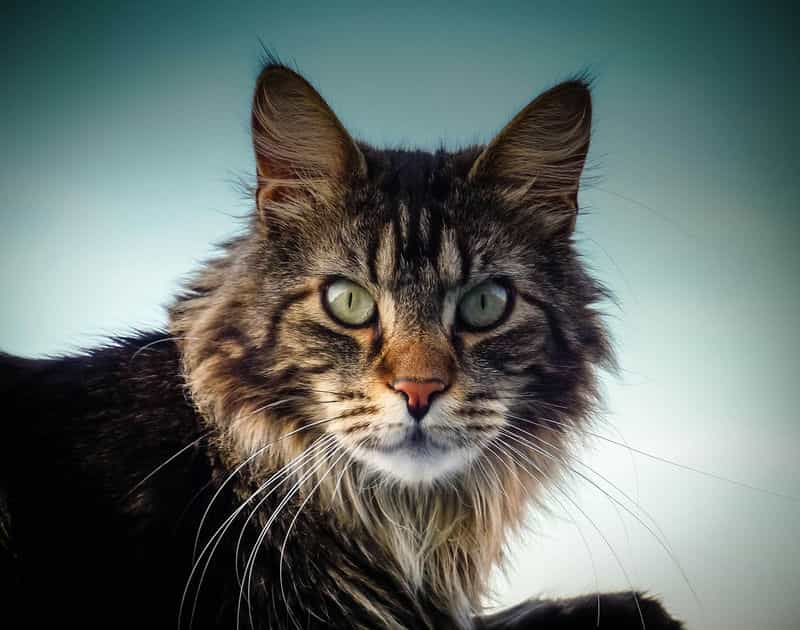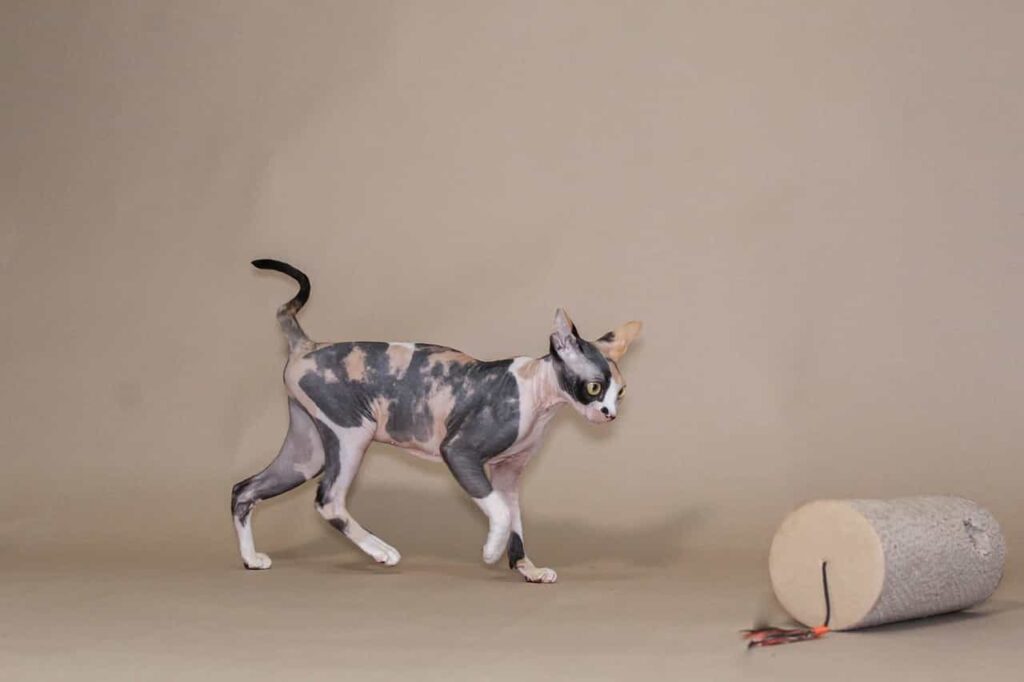Devon Rex cats are famous for their Alien-looking face, slender body, wavy coat, Small heads, big ears, and eyes. The breed also rembles the Sphynx cat but doesn’t have any connection with the Sphinx cat.
Devons are also known for their activity, playing level, and hunger. They can learn hard tricks, but you can’t motivate them easily.
It is an original British breed found in Devonshire, UK, in 1950. Why you shouldn’t get a Devon Rex- everything we’ll know by reading the whole article.
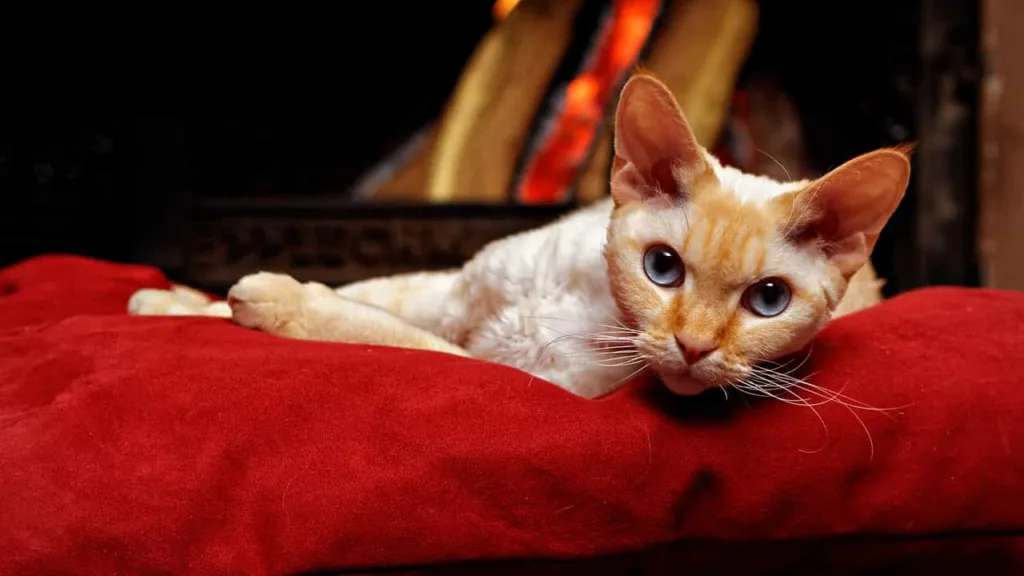

Table of Contents
Breed specialty of Devon Rex:
Other names:
Pixie cat
Personality:
Very much active, playful, social, Affectionate to their owners, Intelligent, dependent, and human-oriented.
Size:
Medium
Coat color and pattern:
Available in any color and the coat patterns are Calico, Tortoiseshell, Tabby, Solid, Shaded, and more.
Coat length:
Shorthair
Length:
About 18 inches
Weight:
Up to 9 Pounds
Eye color:
Available in any color
Friendliness to children and other pets:
Medium
Vocalizing level-
Low
Grooming needs-
Low
Life span:
Up to 15 years
Allergenic:
Yes, because of Dandruff.
Origin:
United Kingdom
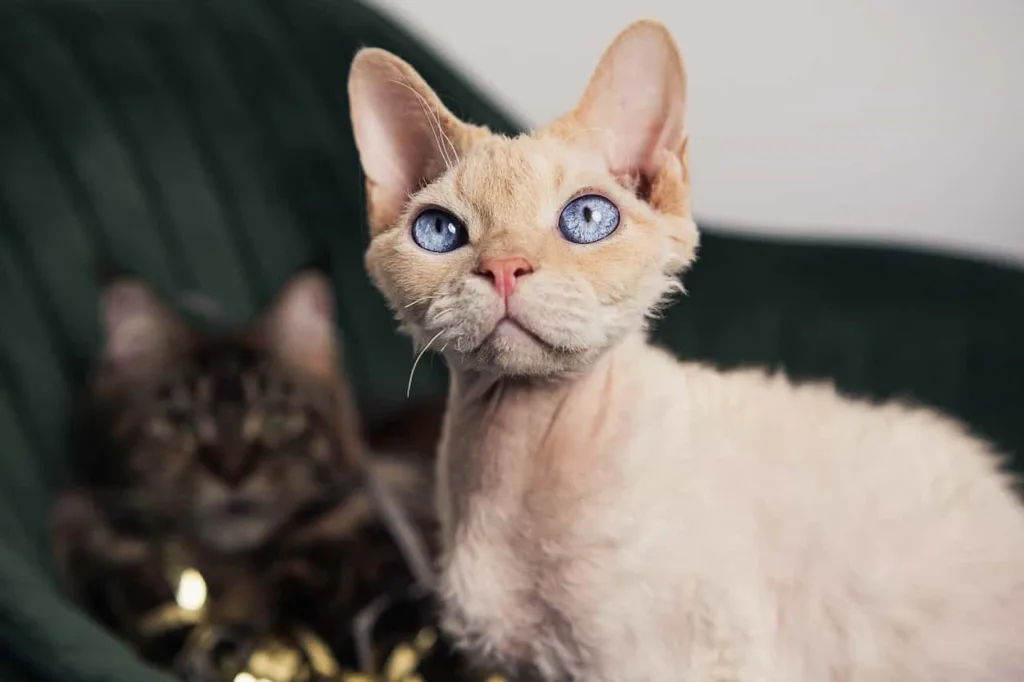

Origin of the Devon Rex breed:
I had mentioned before that the breed was found in Devonshire, UK. In 1950, woman Beryl Cox found a male cat, and she revealed that the cat has a connection with the novel Curly-coated kitten. So, she initially believed that the male cat had a connection with the Cornish Rex breed. However, she named the cat Kirlee.
Moving forward, Kirlee was crossbred with a female Cornish Rex breed to share the same physical traits, but the kittens were born with straight coats.
So, it was proved that an unrelated gene mutation was responsible for the wavy coat. So, Cox realized that Kirlee didn’t have any connection with the Cornish Rex breed.
However, she initiated a broad crossbreeding program, and Kirlee’s mutation was preserved. In 1968, KIrlee’s descendants made their way to the United States.
The Cat Fancier’s Association officially recognized the breed.
Nowadays, Devon Rex cats are available from any reputable breeder.
The appearance of Devon Rex cats:
Their main physical traits are large, floating eyes and big ears, just like the Aliens. The eyes are oval-shaped, always curious, and can be in any color. The ears are very low and wide at the base and pointed, larger than the head. They also have high cheekbones, long necks, and hard, muscular, and slender bodies with broad chests- just outstanding.
The male cat’s body is slightly bigger and up to two inches taller than the female. Their wedge is modified. From the front, it looks narrow. The face has pronounced cheekbones with a whisker pad.
The cheekbones are visible on the whole face. Their legs are long and slim. Paws are oval and small, with four fingers in the forelegs and five fingers in the back legs. The tail is proportionate to the body and tapering, covered with fur.
Their coat patterns are various, and any color is found in the breed. The density of the coat decreases in the head and abdomen area.
Temperament and nature of Devon Rex cats:
Very intelligent, playful, affectionate to the owners, curious, able to learn hard tricks but don’t get motivated easily, and family-oriented breed.
They get very easy to children and other pets and even to strangers. Male cats are very dependent and outgoing, but females are independent and love to stay alone for some time. They don’t meow without any reason.
They don’t cuddle and lap and love to follow you across the house. But their hunger and appetite are a big problem. They are very foody. Love to eat almost all day long.
They love to stay in a big house with many people, and male devons can’t be left alone as they are very human-oriented. They’re mischievous and can lose their temper in a short time.
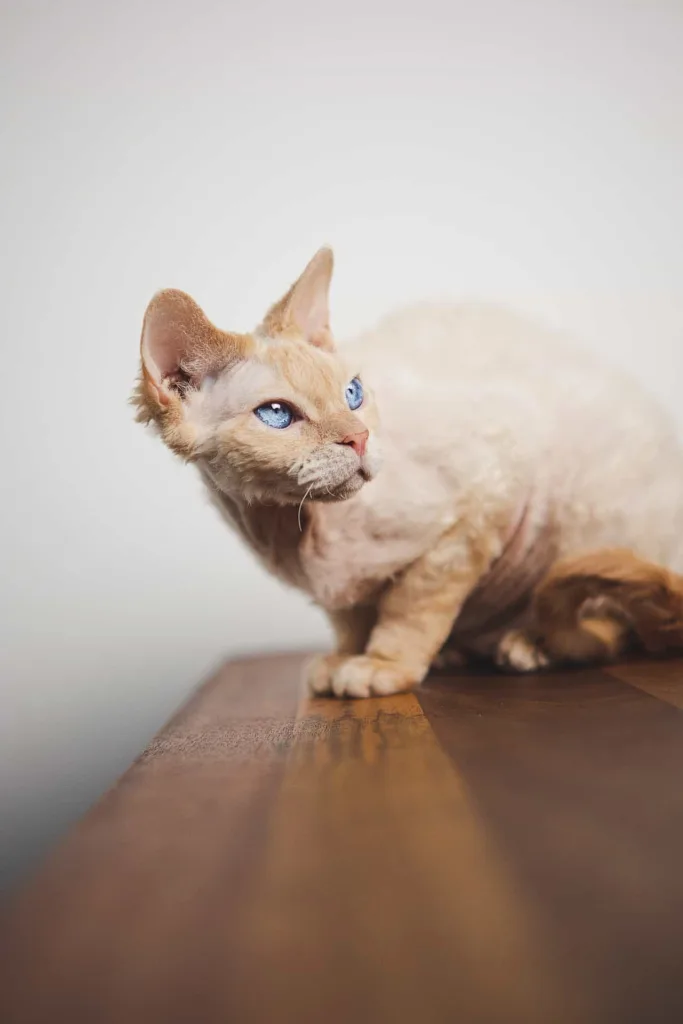

Caring, grooming, and exercise for Devon Rex cats:
Devon Rex has a very good characteristic- they need minimal grooming, perfect for busy people. You don’t need to give much time to take care of and groom them because they don’t need coat brushing and combing. They have very delicate skin. Just wiping their whole body with a soft, wet towel is enough.
They’re prone to Sunburn and cold because of being furless, so keep them indoors all year round. In the Summer to keep aloof from the Sunlight and in the Winter to save from the extreme cold.
Caring for their teeth, nails, ears, and nose is the same as other cats. But Devon rex cats are very active and playful.
So you should provide them with enough toys and tall cat trees for their playing and exercises. Take the male Devons outside with supervision as they love to go there.
Living needs of the Devon Rex breed:
Well, Devon Rex’s living needs are not very simple. They need an affectionate owner, a big house with a big family, and mental stimulation as they hate to be left alone for a long time with many favorite toys so they can play and stay away from the Sunburn.
If you have to stay out of home for long hours, then you must keep 2 Devon Rexs so they can be the reason for mental stimulation of each other.
They also need Sweater and a heating bed in extremely cold conditions. They need more warmth than other breeds.
Health and problems that Devon Rex cats suffer from:
Like the other cats, Devon Rex is prone to some diseases and health issues:
Hypertrophic Cardio Myopathy (HCM):
Very common heart disease among catteries. I have told many times about this in my other articles. When the left wall of the heart gets thick and can’t pump enough blood and supply to the whole body, it is called HCM, and it goes to Heart failure, blood clots, and Heart Arrhythmia.
Congenial Hypotrichosis:
The disease is responsible for baldness or near so.
Patellar Luxation:
When the Knee caps get displaced, it is called Patellar Luxation. Devon Rex is a very active and playful breed, so they fall into this problem.
Devon Rex Mayopathey:
It’s a special problem that affects the head and neck area when the Devon kittens are 3 to 6 months old. It is a hereditary and recessive disease.
Ear and Skin problems:
Yeast infection in the ears is called Malasezzia Dermatitis. Another problem is Urticaria Pigmentosa- responsible for the irritation of the cat’s skin.
So, a regular check-up of your Devon Rex is a must. Visit your Veterinarian after every 6 months.
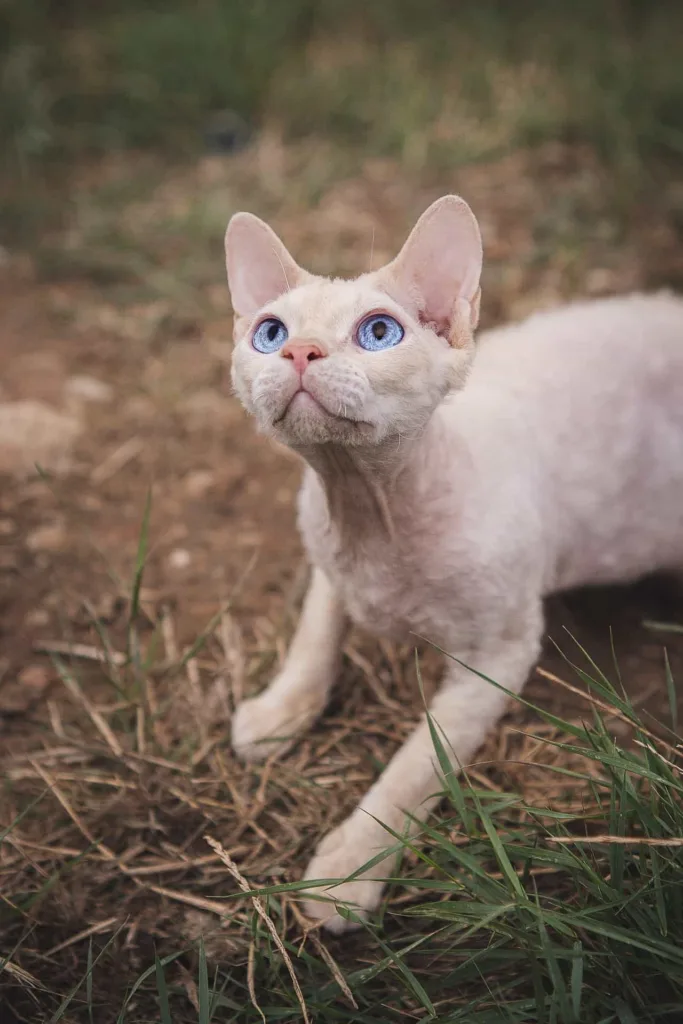

Food and nutrition tips for Devon Rex breed:
You have to be very much cautious about the food habit of your Devon Rex because they can do anything for food, even stealing, begging, and snatching.
Eating can be responsible for diabetes and obesity, which are very dangerous. So, provide them with only commercial cat foods and an ideal measurement.
You must keep a measurement cup and Kibble to feed your Devon, and you also need to keep in mind their age limit.
Food needs vary according to age. Never make their habitat in human food; don’t share your plate with them. Ensure enough protein and nutrients in their food. Don’t leave free food all day long. Make your kitty habituate that will get food in a routine.
Some facts about the Devon Rex cat breed:
- Some Devon Rex has hairs inside their ears, just like humans. It is called era mufflers.
- In the 2019 film Lady with the Tramp, there were 2 Cats one was named Devon, and the other was named Rex.
- There are so many celebrities who have Devon Rex cats. Dita Von Teese, one of them, lost her Devon in June 2020. Musician Marilyn Manson and World famous film Director Steven Spielberg also have Devon Rex Cats.
Where can I get a Devon Rex?
You can search the website of the Cat Fancier’s Association (CFA) and The International Cat Association (TICA). They publish a list of reputed and trusted breeders. You can also go to the shelters specialized for Devon Rex cats because they may not be available in common cat shelters.
Devon Rex cats don’t be abandoned. So it is hard to find them in the rescue groups. There are some websites where you can contact both for adopting and rescuing Devon Rex cats, such as Planet Devon, Petfinder.com, and Adopt-a-pet.com.
How to identify a Devon Rex cat?
There are some methods to identify a Devon:
Method no.1:
Examine their physical appearance:
Feel the curly coats with ripples and waves; look at their large ears in a small face just like the Aliens; their eyes come in different shades, look for large and bat-like ears, which are triangular with deep cups.
When you notice from near, you’ll notice short hairs on the ears.
Notice that, they have a long, elongated, and thin neck with thinner furs than the body. Their weight is a noticeable thing. Usually, their weight is about 9 Pounds.
Method no.2:
Observe their temperament:
They’re very active and playful. Try to play hide and seek with them whether they respond or not. To taste that, hide in front of them. If they come to find you then they’re Devon Rex.
Devon Rex cats are known for having unusual foods such as Lemons, Asparagus, Olives, and kinds of foods cats usually show interest in. So, gauge your cat’s interest in unusual foods. If it wants a bite, no matter how unusual, it’s definitely a Devon Rex.
Another way to recognize that they enjoy the cuddle and lap of their owners. So, take them to your lap. If they love to stay, then they’re Devon Rex.
Method no.3
Take professional help. Take a vet or breeder with you while you adopt Devon Rex. you can conduct a DNA test on the cat you want to adopt in a Lab. the tests are 90% accurate.
Besides, you may collect the pics of Devon Rex from the internet and compare your one with the pics.
Breed Overview of Devon Rex:
Devon Rex cats are a great addition to any family. A delicate-skinned, Alien-looking, very active, playful, and a big eater breed and a bit mischievous. They love to play, interact and steal food from their owner’s plate and from the kitten.
A traveler cat breed- loves to travel with their owners instead of staying home. You are lucky if you have the opportunity to have a Devon Rex.
7 reasons that you shouldn’t adopt a Devon Rex cat:
Devon Rex is a very good pet cat but not suitable for everyone. So, you must know the facts before adopting them:
- Devon Rex isn’t a good choice if you want a calm, lap, and cuddly cat. Devon Rex is a very active and playful cat. They always love to jump and play.
- If you have a small house and don’t have enough place to spare for their jumping and playing.
- Having a Devon Rex is very much expensive because they’re big eaters. So, if you can’t afford the expense or don’t have much time to feed them and maintain a schedule, look for another cat.
- Devon Rex is very stubborn, often doesn’t listen to you, and does what they love to do. So, if you can’t tolerate this, don’t have a Devon Rex.
- Male Devons are outgoing, but you shouldn’t leave them without supervision, so they are not a good choice if you can’t take them out.
- A very expensive breed starts from $1000. So, don’t adopt the breed if your pocket doesn’t allow you.
- They like a full house- full of members, children, and animals. So, if you live alone or with your spouse, go in another direction. Devon Rex can’t tolerate silence and loneliness. So, don’t make them bored if you don’t belong to a full house and a joint family.

